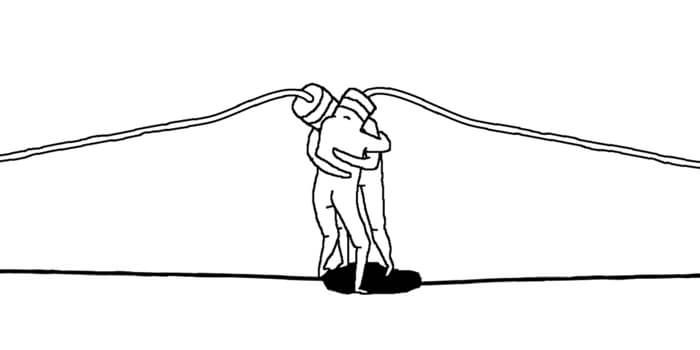Plug & Play, by artist Michael Frei and programmer Mario von Rickenbach of Etter Studio, has garnered lots of positive attention since its March 5th release on Steam. This is pretty surprising given its art-house minimalism and 15 minutes of playtime. True, the game is based on a lauded, experimental short film, and it does capture a lot of the raw realities of being human—love, rejection, excretion, intercourse, and messy relationships. But I think what makes this unlikely game such a random hit is its laugh-out-loud “WTF!?!” humor and intriguing melding of film and gaming.
Describing Plug & Play is somewhat of a challenge. Imagine Don Hertzfeldt’s Rejected, just shorter, slightly more obscene, and in game form. There is no setting per se, just a few plugs, a few outlets, and a few dudes with plugs/outlets instead of heads. Yeah, let your imagination run wild. The soundtrack is spacey and sometimes operatic, and the sound effects are clear and appropriate. The controls, which are very simple, are immediately intuitive. Since there is so little going on in any given scene, it’s important to get the few elements that are in play totally precise. The game’s designers accomplish this quite well—allowing their hand-scribbled content to be the star of the show, with no distractions.
The editing and pacing of the scenes in Plug & Play is done with impeccable comedic timing, playing into one of the game’s great strengths. A lot of the humor catches you by surprise, and the fact that this game was adapted from a short film likely informed this clever timing.
It was simultaneously jarring and awesome how the game allowed you to direct the action at some points, and then took over at others. All in all, it created this delightful, cringing sense of “Oh gawd, what happens when I press this button?” throughout.
The puzzles in Plug & Play are simple, and only one or two scenes come to mind where I didn’t immediately know what to do to advance to the next scene. This lack of “gaming” is why it feels more appropriate to label Plug & Play an “interactive film” as opposed to a “game." That being said, the experience of playing Plug & Play is very different from watching the short film of the same title; it allows a different relationship between the artist and the viewer, and appeals to a slightly different demographic. As someone who enjoys experimental films such as Un Chien Andalou, Eraserhead, and the aforementioned Rejected, I’m very happy to see this kind of cross-pollination between the worlds of gaming and film.
The game's incredible use of humor bears mentioning again, to give credit where credit is due. In recent memory, no game has made me so perplexed or caused me to laugh so hard—making it all the more disappointing that the game lasts for a paltry 15 minutes.
The game has gotten some flack for having a $2.99 price tag for such a short play time, but I still think small but smart games like Plug & Play are a welcome industry development. While I understand the tendency to assign value or cost based on a game's total length, I don't think this should be applied universally across the medium. I’d love to see shorter vignette gaming experiences like this one, provided they leave a similarly lasting impression.
In the end, what does this short, ridiculous, and at times hilariously disgusting game have to say about the human condition? To quote the artist, it is “about nothing less than love.” And like many surreal and experimental artistic creations, this game cannot be adequately described with words. It's better to be experienced—in a famously gross internet video kind of way.

